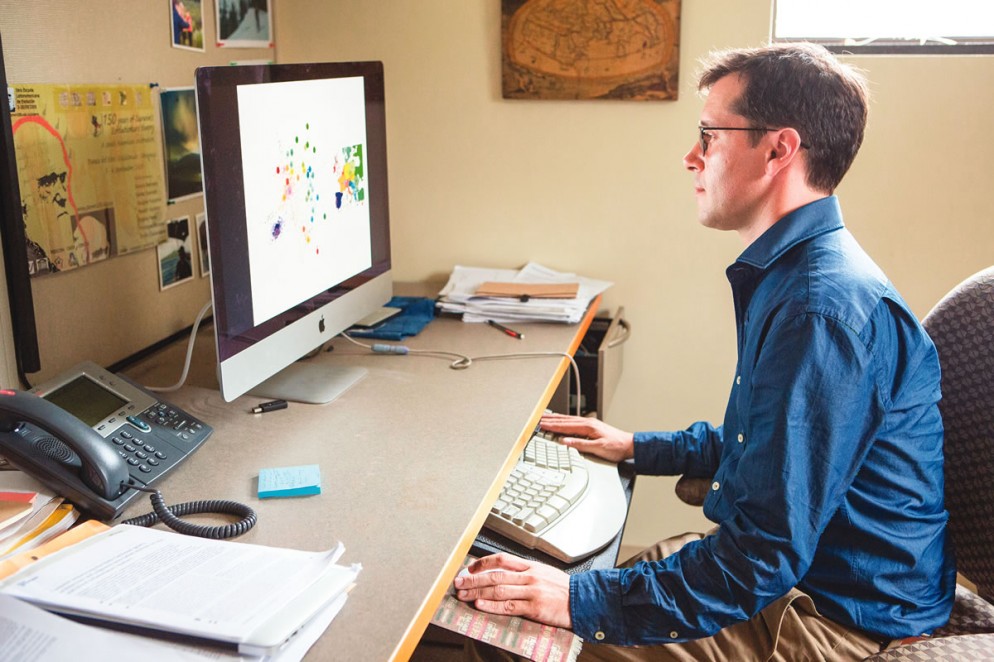Everyone calls it the “genius award.” The official title is the MacArthur Fellowship, and it’s a cool $625,000, five-year stipend with no strings attached. Among this year’s recipients, “24 Extraordinarily Creative People Who Inspire Us All”: John Novembre, a biochemistry major who graduated cum laude from Colorado College in 2000.
“I’m tremendously honored to have received the award,” Novembre said when the award was announced in late September. “One of the first things I did … was to email Ralph Bertrand [professor of molecular biology] and Jim Ebersole [professor of organismal biology and ecology] to thank them for the mentorship they gave me at Colorado College and beyond.”
Novembre, who grew up in Colorado Springs, credits CC projects on subjects such as the genetics of oaks for spurring his interest in population genetics.
“When I reflect on what is special about Colorado College and how it has served me, two great things jump to mind: The liberal arts tradition — with its emphasis on broad learning, problem solving, and clear writing — has been a bedrock for me. The second is the adventurous spirit of CC. It is a continual inspiration to think outside the box and live more creatively.”
He also formed lifelong friendships at CC — what he calls a “great tribe.”
His work as a computational biologist and associate professor of human genetics at the University of Chicago has led to new ways of exploring geography, genomic diversity, and demographic structure. The data visualization and analysis techniques he’s developed are providing new knowledge of human history, population structure and migration, and the origins of genetic diseases.
“I love that it’s so interdisciplinary — there are days where the focus is on algorithms, other days, statistics, other days, molecular genetic processes, other days human history, languages, archaeology, and disease. Being at an undergraduate liberal arts college really prepared me well for this.”
Novembre earned his Ph.D. from the University of California at Berkeley in 2006. He was a National Science Foundation postdoctoral fellow in bioinformatics at the University of Chicago (2006-08) and was affiliated with the University of California at Los Angeles (2008-13).
Early in his career, Novembre discovered flaws in principal component analysis (PCA), the traditional way to analyze the geographic distribution of genetic diversity. This called into question the interpreta-
tion of PCA waves as clues to large-scale migration, leading to work with collaborators to cement the correlation between shared ancestral geography and genetic parallels among Europeans.
The team’s research verified the importance of location in determining DNA patterns and demonstrated the use of genetic sequencing to pinpoint ancestry within a couple of hundred miles.
Novembre went on to develop a new technique to estimate recombination rates using ancestry blocks of admixed populations (in other words, not ancestrally homogenous populations). Recombination is the basic process in which parental genetic material is combined in a person before it’s passed to the next generation. The recombination rate describes how many recombination events — points on the genome where genetic material switches from one parent to the other — happen over time in a group.
He and his collaborators identified the breakpoints (crossovers that change ancestry) of African and European ancestry to extrapo- late the recombination rates in African-American genomes (representing a largely West African and European admixture only a few hundred years old). Their research has provided more detailed genetic maps for African-Americans, improving studies on the genetic origins of disease and global genetic diversity.
“Sometimes we’re directly involved in disease research, but more often we’re working on gaining a global understanding of human genetic diversity that informs us about our past and helps us know the stage upon which heritable disease plays out,” Novembre said.
The MacArthur grant will give Novembre and his team of about eight people more time to focus on research.
“Right now we are facing the challenge of how to extract the abundant information in whole genome sequences in an efficient manner. We’re drinking from a fire hose,” he said.
